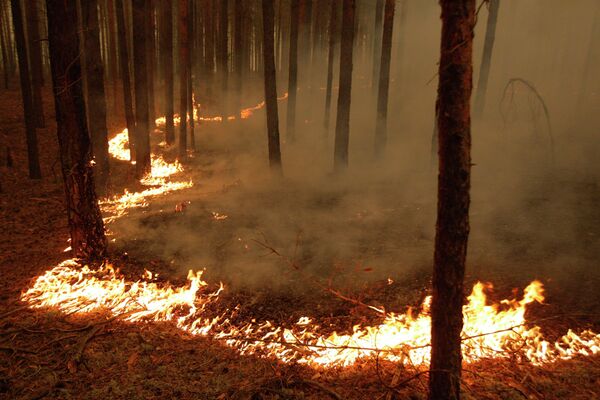It has grown into a bad tradition for Russian authorities to panic at winter cold and summer heatwave alike. Both weather extremes provoke natural disasters: winters destroy water supply systems and leave buildings and whole neighborhoods to freeze without heating, while summers unfailingly bring peat bog fires.
This summer Russia has been hit by a record heatwave, and wildfires are raging worse than ever, destroying homes and causing deaths and injuries. The government is taking emergency relief actions; First Deputy Prime Minister Viktor Zubkov even proposed closing off the forests to prevent more ignition sources.
However, analysts believe that some necessary precautions and advance preparations could have reduced the dramatic impact to a large extent.
Firefighting reports sound more like news from the combat zone. Wildfires have spread across the country engulfing 128,000 hectares of land, killing 34 and leaving 2,210 people homeless, according to a recent Emergencies Ministry report. Two federal ministries - the Emergencies Ministry and the Defense Ministry - are responsible for fighting the wildfires, and their resources include 180 emergencies experts and 4,000 servicemen, 200 special vehicles, and 14 airplanes and helicopters.
A special pipeline-laying squadron of the Moscow Military District has laid over 7 km of pipes out of the 20 km planned to supply water for firefighting in the Yegoryevsk and Shatura Districts. Volunteers join professionals in the relief efforts. Residents of local villages do not wait for the fire to come to their houses: They set up fire-fighting brigades, monitor and suppress new ignition sources with fire swatters.
But the real tragedy is that much of the trouble could have been avoided, including casualties and emergency efforts. First of all, the peat bogs, which are a huge fire hazard, are a human-induced problem. Before West Siberian oilfields development began, the Soviet government used peat reserves as a good commercial fuel. However, as the "oil age" began, peat-bog exploitation was abandoned. Central Russia has been suffering from peat fires every summer since then.
The most obvious solution would be to flood, or irrigate, if we use a scientific term, the peat bog areas. In fact, environment experts warn that this should be done anyway, not only to eliminate fire risks. However, the officials responsible for this have not had time to address the problem for decades. Now their negligence has been aggravated with economic problems.
The national economy is struggling with a downturn, while irrigation of vast expanses requires major investment and special equipment which Russia does not have. What's worse, Russia does not have a workable melioration infrastructure. "All the relevant brigades and agencies were abolished long ago," Viktor Danilov-Danilyan, director of the Russian Academy of Sciences' Institute of Water Problems, told a news conference at RIA Novosti. "It has been 20 years since we had a mobile hydro-melioration convoy," he added.
Yet, if necessary, the bogs could be flooded gradually, starting with the most dangerous points where residential areas are under threat, and isolating them as we go along. The costs may be cut significantly, if the money is used wisely. The most crucial preventive measures will require at least 500 million rubles ($16.5 million), according to Danilov-Danilyan's estimates. This does not seem unaffordable, especially compared with the recent cash injections to support certain companies as the economic crisis hit, or with subsidies regularly received by some of the problem regions in southern Russia.
The amount cited is only the minimum required, the environment expert admitted, which should be enough at the first stage, if no drought is expected. However, this summer's weather forecast should have sent allocations for fire prevention up tenfold, to 5 million rubles. "This will not resolve the problem, but the amount should be spent on the most indispensable actions in this situation," Danilov-Danilyan added.
Five million rubles does not sound like an unaffordable amount for the Russian government either. Yet, no preventive measures have been taken, and there are still no irrigation plans in place. This suggests that money is not the problem. The government seems to lack the political will and organization to deal with problems of such importance, despite their urgency.
Vlad Grinkevich, RIA Novosti economic commentator
The opinions expressed in this article are the author's and do not necessarily represent those of RIA Novosti.



